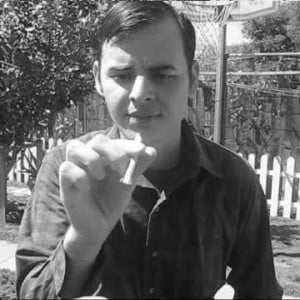 Yesterday I was a presenter at the Better People Educational Forum in Downtown Portland. This was held in the Multnomah County Public Defender’s Office and asked the question “Marijuana: Should it be Legal?” I made my presentation for the YES side of the case which you can view on my RadicalRuss YouTube channel and which you can download , complete with script, from 420RADIO.org.
Yesterday I was a presenter at the Better People Educational Forum in Downtown Portland. This was held in the Multnomah County Public Defender’s Office and asked the question “Marijuana: Should it be Legal?” I made my presentation for the YES side of the case which you can view on my RadicalRuss YouTube channel and which you can download , complete with script, from 420RADIO.org.
Speaking for the NO side of the case was Sgt. Chris Kenagy from the Portland Police Bureau. He is in charge of the Drug & Vice Task Force. In addition to claiming alcohol prohibition didn’t work because there were simply too many people who like to drink, but “we can stop them from getting marijuana”, Sgt. Kenagy said regarding marijuana prohibition, “I think it’s worth it,” and since only 7.3% of the population uses cannabis, “why should we care?”
But what I want to spend time on today is helping Sgt. Kenagy understand that his most cherished reefer madness is utter bullshit. Sgt. Kenagy opened up his presentation by stating that the number one reason he was opposed to marijuana legalization was because cannabis is a “gateway drug”. He even went so far as to say that “every single study has proven it is a gateway drug”. He then went on to talk about all the heroin, cocaine, and meth addicts he ever had to work with and “100 percent of them started with pot.” As Sgt. Kenagy explained it, “when you first start using marijuana, you get a high, but after a while you develop a tolerance, and so you begin looking for other ways to get a stronger high.” He also explained that “using marijuana lowers your inhibitions for using other drugs.”
It’s easy to understand why a drug and vice cop might sincerely believe marijuana leads to hard drugs, in the same way that an emergency room doctor might believe drinking inexorably leads to auto crash trauma. It’s because of what’s called “selection bias”, the fact that all the drug users a cop meets or drinkers an ER doc meets are there because of their victim’s problems with drugs and alcohol. Sgt. Kenagy never interfaces with the vast majority of cannabis consumers who are neither hard drug users nor have gotten caught with pot.
What Sgt. Kenagy and the “gateway drug” believers are also suffering from is retroactively attributing causality where none exists. If you ask a heroin user what’s the first drug she tried, she will probably say “marijuana”. (Unless she’s smart enough to recall that cigarettes and alcohol are drugs, since more heroin addicts will cite those as their first substances when properly asked.) That doesn’t mean marijuana led the woman to heroin, it just means that heroin users tend to have used marijuana.
Here’s a way to think of it that’s a riff I picked up on from Maia Szalavitz in TIME, and I so wished I’d had the opportunity to confront Sgt. Kenagy with it. Did you ever ride a tricycle as a kid? Sure, many of us have. Why did we do it? Because it was fun, it took us places faster than walking, we liked the breeze in our hair, maybe the tassles on the handlebars and its pretty red color. OK, now how many of you are members of the Hell’s Angels Motorcycle Club? Nobody?
Well, that’s strange, because when I asked a bunch of Hell’s Angels bikers what was the first vehicle they ever drove, “100 percent of them started with tricycles.” As they explained it to me, “when they first started riding tricycles, they had a lot of fun, but after a while they grew out of them, and so they began looking for other ways to ride for fun.” They concluded, “riding tricycles lowered our inhibitions to ride training wheel bikes, then BMX bikes, then motorbikes, then finally big loud Harleys.”
The facts are these: 108 million people in America have tried marijuana. There are about 16.1 million monthly users of marijuana and only 287,000 monthly users of heroin. Not only do most people who try marijuana never move on to heroin, the vast majority of them don’t even continue smoking marijuana!
As for “every single study”, they actually debunk the gateway drug theory. As our Institutes of Medicine put it in 1999, ”There is no conclusive evidence that the drug effects of marijuana are causally linked to the subsequent abuse of other illicit drugs… In fact, most drug users begin with alcohol and nicotine before marijuana, usually before they are of legal age.” In 2001, the American Journal of Public Health said, ”A careful analysis of all of the data suggests that the gateway phenomenon characterized the drug use subculture of some baby boomers, but does not apply in the same manner to the generation that started using marijuana in the mid-1990s.” In 2002, RAND’s Public Safety and Justice unit said, ”While the gateway theory has enjoyed popular acceptance, scientists have always had their doubts. Our study shows that these doubts are justified.” In 2006, The American Journal of Psychiatry said, “the likelihood that someone will transition to the use of illegal drugs is determined not by the preceding use of a particular drug, but instead by the user’s individual tendencies and environmental circumstances.” And in 2010, the Journal of Health and Social Behavior said, ”It really didn’t matter if someone used marijuana or not as a teen” in predicting their use of hard drugs.
Yet all these studies point out that access to marijuana and drugs and the pressures of the illicit market do tend to be predictors of drug use. It’s not the cannabis that’s the gateway, it’s the prohibition of it. Nobody thinks of tequila and cigarettes as gateway drugs because there’s no heroin and cocaine next to it on the store shelves. But when you have to break the law and visit an illicit market to consume cannabis, you’re also presented with greater access to other drugs. And for some, once they’ve violated the law and become “a druggie”, there is a loss of an inhibition, a crossing of a line, that someone who is a legal drinker doesn’t feel. For others, when they do get access to cannabis and discover it’s not the deadly dangerous devil’s lettuce that will shrink their balls, enlarge their man-boobs, lead to heroin, and turn their brain into a fried egg, they feel lied to and bamboozled and may lose the inhibition of believing the mostly-factual information about hard drugs.
Sgt. Kenagy seemed like a nice man and off-stage, much less strident in his anti-marijuana tone. He genuinely seemed to not really care as much for policing marijuana, consistently saying onstage “we concentrate on heroin, meth, cocaine,” which I believe, as Multnomah County Sheriffs and Portland Police Bureau do tend to give wide berth to cannabis when they can. So Sgt. Kenagy, please, help us close what gateway there is between marijuana and hard drugs by separating those markets, like the Netherlands did thirty years ago. They enjoy half the marijuana and drug use rates we do in the United States and even lower rates compared to Oregon and far lower rates compared to Portland.
Source: National Cannabis Coalition – make a donation
























